Twin Challenges—Rendering Aid After Haiti's Quake
By Yeh Tzu-hao (葉子豪)
Photos by Keziah Jean (凱辛亞)
Translated by Wu Hsiao-ting (吳曉婷)
Twin Challenges—Rendering Aid After Haiti's Quake
By Yeh Tzu-hao (葉子豪)
Photos by Keziah Jean (凱辛亞)
Translated by Wu Hsiao-ting (吳曉婷)
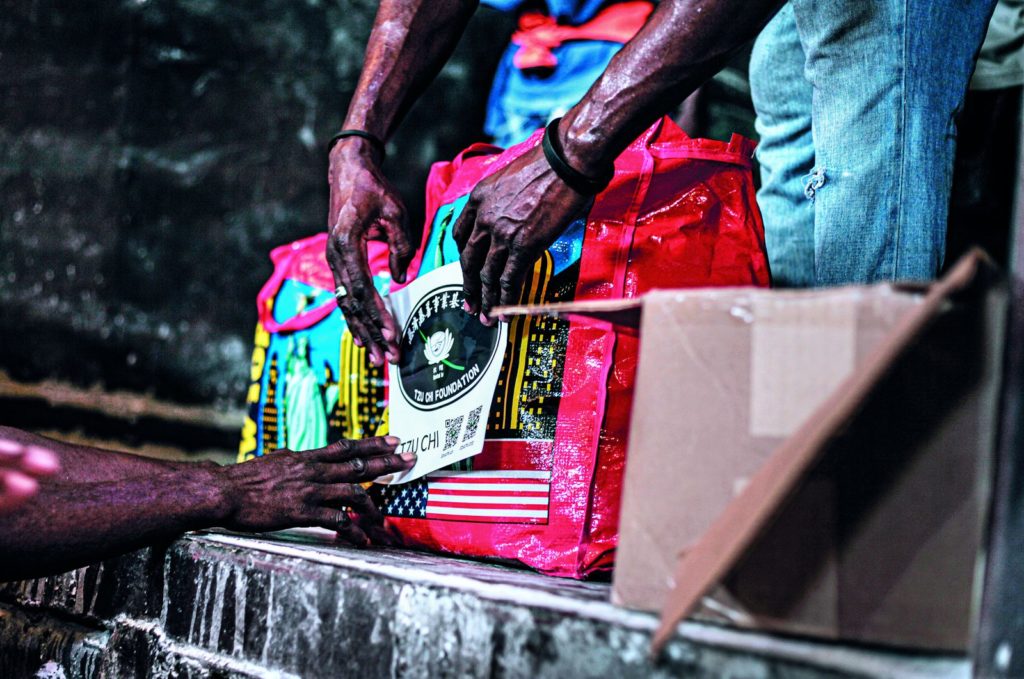
Heavy bags of food provided by Tzu Chi for quake victims in Haiti. The foundation launched large-scale distributions in the country after it was hit by a massive earthquake on August 14, 2021.
In the summer of 2021, with COVID-19 still rampant in many countries, several man-made and natural disasters hit North America and Asia. Their effects were felt around the world. First, Haiti's president Jovenel Moïse was assassinated in his private residence on July 7, plunging the country into political turmoil. Then, as the nation was still reeling from the violent tragedy, a magnitude 7.2 earthquake hit on August 14, killing more than 2,000 people. The tremor also destroyed or damaged nearly 130,000 buildings, leaving 650,000 people in dire need of help. Immediately afterwards, on August 15, Taliban insurgents took Afghanistan's capital, Kabul, and leveraged themselves into power. This political upheaval triggered a massive exodus of Afghan people from their country. For a while, Afghanistan commanded the attention of the entire world, and Haiti's plight was all but forgotten.
But Tzu Chi didn't forget the Haitians or their dire need for help. Local volunteers assessed the damage in disaster areas and provided whatever aid they could soon after the quake. Then, on September 1, a Tzu Chi team from the United States arrived in Haiti's capital, Port-au-Prince, to help organize quake relief work. Upon arrival, the team visited the campus of the Overseas Engineering & Construction Co. (OECC). The OECC is one of Tzu Chi's partners in Haiti. There the team met with several people to discuss Tzu Chi's relief plan, including Johnson Chang (張永忠), an OECC employee and Tzu Chi volunteer, and Father Zucchi Olibrice, another Tzu Chi volunteer. They decided to launch large-scale distributions in Les Cayes, a badly hit area in southwestern Haiti, on September 8.
The arrival of the Tzu Chi volunteers was a godsend for some Catholic priests and nuns, who were worn out from tending to quake victims. Many people had lost their homes in the strong quake and desperately needed food and other supplies. The rice and other necessities Tzu Chi was planning to distribute would go a long way toward relieving their plight. "We didn't have anything to distribute to the victims after the quake," said Sister Rose Monique Jolicoeur of the Soeurs Salésiennes. "The aid operation initiated by Tzu Chi is so important to the locals."
It wouldn't be easy to get the aid to victims though. In addition to the threat of COVID-19, another challenge facing Tzu Chi was gang violence. Volunteers and partners would have to proceed with the utmost caution.
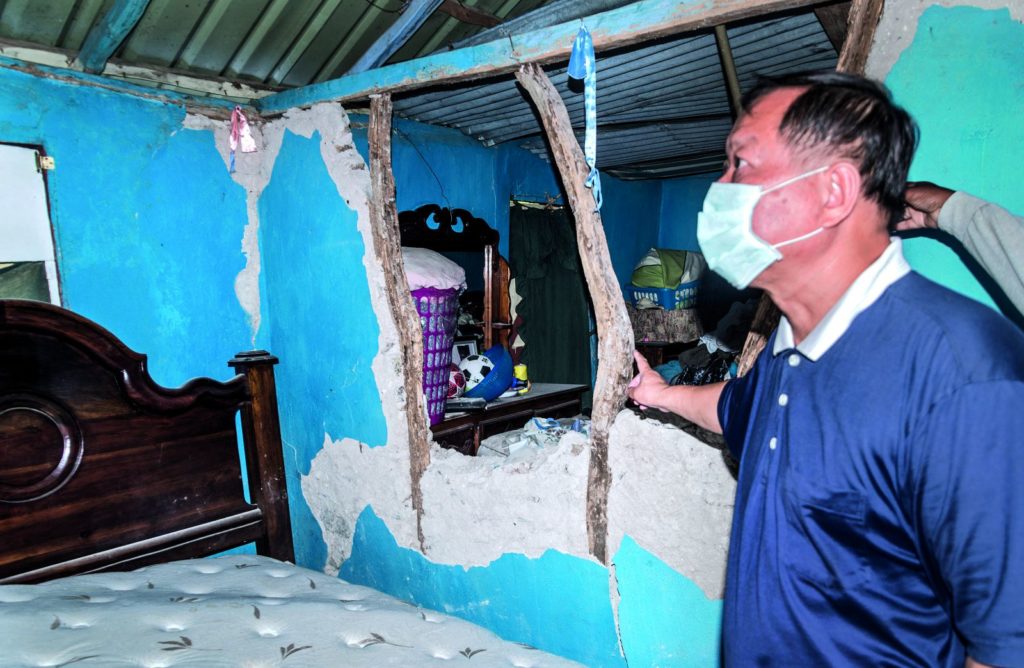
Volunteer Johnson Chang inspects a damaged house in quake-stricken Les Cayes. Because of poverty, many people in Haiti couldn't build houses up to the government's building codes. With crooked tree trunks used in place of steel bars, a house could barely withstand the strong earthquake. (Photo by Réginald Louissaint Junior)
Initiating Help
"I've been in Haiti for 22 years," said volunteer Johnson Chang, who is from Taiwan. "When the big earthquake hit in 2010, I happened to be on a leave of absence from work and was back in Taiwan. This latest tremor was the first massive earthquake I've experienced in Haiti."
Chang explained that the quake had occurred during work hours in the morning of August 14. It was deeply shocking. Around noon, he learned that the epicenter was located in the southwestern part of the nation, and he heard reports of collapsed churches and private residences. The first thing he did as a Tzu Chi volunteer in Haiti after the quake was to inquire after the safety of other Tzu Chi volunteers in the country. He also contacted the Congregation of the Sisters of Saint Anne to find out whether the three schools Tzu Chi had helped rebuild for the Congregation after the 2010 quake had been damaged. Fortunately, no volunteer was injured in the temblor, and the three schools, located on the outskirts of Port-au-Prince, about 120 kilometers (75 miles) from the epicenter, were still standing. The Tzu Chi Haiti Campus, also located in the capital, had made it safely through the temblor too.
Despite that good news, the southwestern part of the nation had been devastated. The energy released by the quake this time was twice the amount released by the quake of 2010, resulting in huge casualties. Cities such as Les Cayes and Jérémie were among the hardest hit.
Adding insult to injury was a tropical storm that battered Haiti within days of the devastating quake. Pummeled by a rapid succession of unfortunate events—the assassination of the nation's president, the earthquake, and now the storm—Haiti, an impoverished country, was ill-equipped to handle it all alone. Acting President Ariel Henry appealed to the international community for help.
Immediately afterwards, the Haitian General Directorate of Civil Protection and Taiwan's embassy in Haiti sent people to the Tzu Chi Haiti Campus to talk with volunteers about quake relief matters. When Johnson Chang learned that survivors in the disaster areas were in dire need of tents and sleeping bags, he quickly arranged for the donation of 500 blankets, which were stored at the time in the warehouse at the Tzu Chi campus. Father Zucchi Olibrice quickly provided rice for quake survivors too. The rice was originally intended for lunch for schoolchildren after the new semester began, but "saving lives comes first," said the Father. "Nothing is more important now than attending to the needs of quake victims."
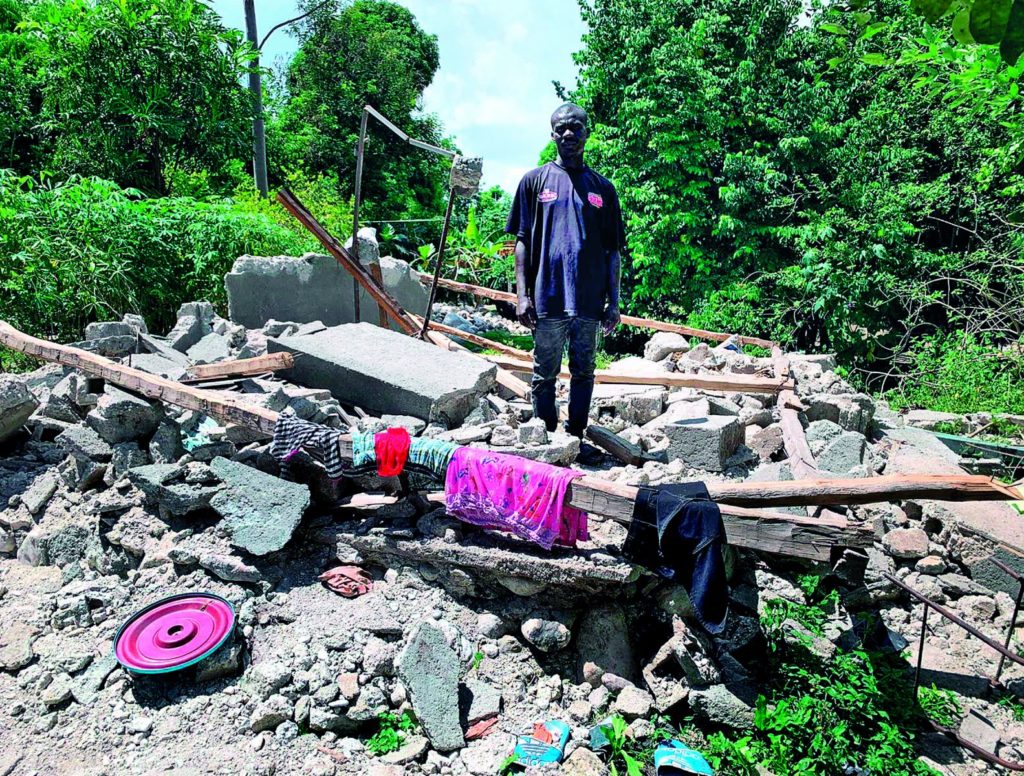
A quake survivor stands amidst the ruins of his home in Camp-Perrin, Les Cayes. (Photo by Ting Fan)
After sending off the 500 blankets mentioned above, Chang, a civil engineer by profession, traveled to the disaster zones on August 21 to assess conditions. He saw broken walls, piles of debris everywhere, and people sheltering in tents. In Les Cayes, a beautiful port city with a 500-year history, at least three hotels and two churches had collapsed. Among those killed was Gabriel Fortuné, a former mayor of Les Cayes. Hospitals were packed with the injured. But those who had it worst were people living in indigent rural areas. Almost none of the makeshift houses farmers had built on their own had survived the temblor.
Chang pointed out that unlike Port-au-Prince, which is shielded by mountains on the northern and southern sides, the disaster areas had no such natural buffer. Residents there live at the full mercy of Mother Nature. To protect themselves from hurricanes, residents tried to erect buildings that could withstand strong winds. "But it was beyond them [because of their poverty] to follow the building codes and use reinforced concrete to construct their houses," said Chang. "Instead, they resorted to the use of crooked tree branches or trunks as pillars. Even the concrete mix they used wasn't correctly proportioned. With all of that, it's no surprise their houses didn't stand a chance against the strong earthquake."
Seeing the challenges confronting Haiti following the assassination of its president and the catastrophic earthquake, Tzu Chi mobilized volunteers in the United States to help out. Veteran volunteers including James Chen (陳健), Curtis Hsing (邢敏), and Ting Fan (范婷), as well as Jaime Puerta, who would help photograph and document their trip to Haiti, arrived in the nation two weeks after the quake. Chen, Hsing, and Fan had all taken part in Tzu Chi's relief efforts after the 2010 Haitian earthquake. Another purpose of their trip this time was to help train local volunteers so that they would be better able to respond to a future disaster and shoulder the responsibility to help their own people. "Haiti must stand up on its own," said Debra Boudreaux (曾慈慧), deputy CEO of Tzu Chi USA.
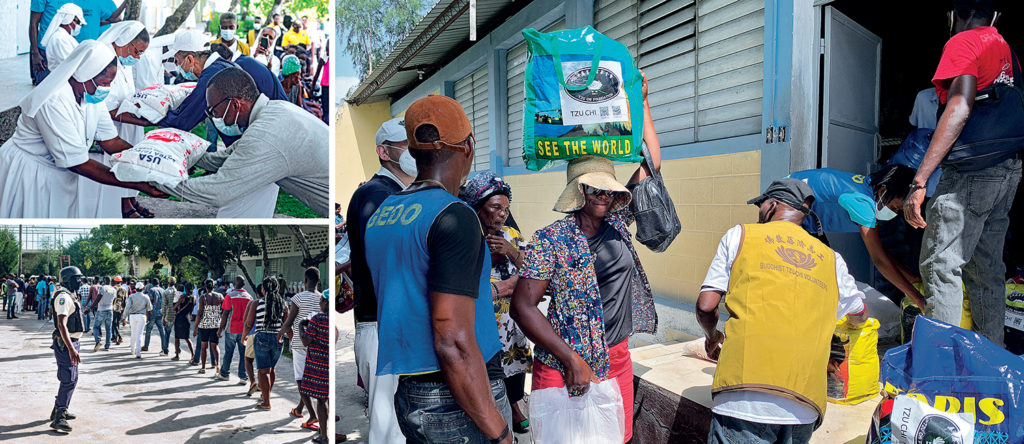
Tzu Chi volunteers donate rice to nuns of Soeurs Salésiennes for further distribution to quake victims (top left). A bag of rice and another bag of assorted food items are enough to last a family of six to eight for a month (right, photo by Ting Fan). People proceed in orderly lines to receive aid from Tzu Chi (bottom left).
The Threat of the Pandemic and Gang Violence
On August 23, 2021, the Centers for Disease Control and Prevention in the U.S. increased its travel warning for Haiti from level 3 to level 4, indicating a very high level of COVID-19 in the country. Scant medical resources, low vaccine coverage, and people's lack of vigilance against the coronavirus in Haiti posed a challenge for Tzu Chi volunteers as they worked to carry out the foundation's quake relief operation. Every member on the Tzu Chi U.S. team had been fully vaccinated before they went to Haiti, but they took due precautionary measures during their stay in the country, such as wearing masks and tracking their temperature.
Another challenge was the rampant gang violence in Haiti. The situation was so bad even the military and police were at their wits' end. Chang said the reason he didn't visit the disaster areas until August 21 was because the main streets there were blocked by gangs. The threat of gang violence was another reason the relief operation this time was much more difficult to conduct than after the 2010 quake. Back then, personnel from disaster response organizations were protected from gangs by the United Nations peacekeeping forces and U.S. troops. But now, with foreign troops having withdrawn from the country, if a truck laden with relief supplies were to enter road sections controlled by gangs, a robbery or blackmailing might occur. Faced with the danger posed by gangs, Tzu Chi volunteers and partners had to be very circumspect and stand at the ready to make any last-minute change of plans.
On the same day the Tzu Chi U.S. team arrived in Port-au-Prince, relief goods provided by Tzu Chi headquarters in Taiwan and the Taiwan Red Cross arrived at the Tzu Chi Haiti Campus. Six thousand five hundred family medical kits packed by Tzu Chi volunteers in the United States had also been loaded for shipping from Miami to Haiti.
In addition to the relief items from abroad, volunteers also purchased goods locally for distribution. With the enthusiastic support of a supplier, Tzu Chi was able to obtain a wide variety of goods in large quantities, including rice, beans, corn, spaghetti, macaroni, and cooking oil. All told, each recipient family would receive a 12.5-kilogram (28-pound) bag of rice and a 25-kilogram (55-pound) bag of assorted food items.
Considering that people in the disaster areas might have difficulty obtaining clean drinking water, volunteers also managed to procure water purification pills for distribution. Each set of food aid included 20 water purification pills, enough to purify a hundred gallons of water. When Keziah Jean, a local photographer helping to record Tzu Chi activities, learned that the foundation was including water purification tablets in its distribution items, she was surprised and happy. She said that the kind of water purification tablets Tzu Chi was providing had already been in great demand in Haiti before the quake, and they became even harder to get after the quake. "People who receive Tzu Chi's aid will definitely be very happy," she said. "Access to clean water has long been an issue in Haiti. Many people have died after becoming sick from drinking unclean water, so it's very considerate of Tzu Chi to try to help address this issue."
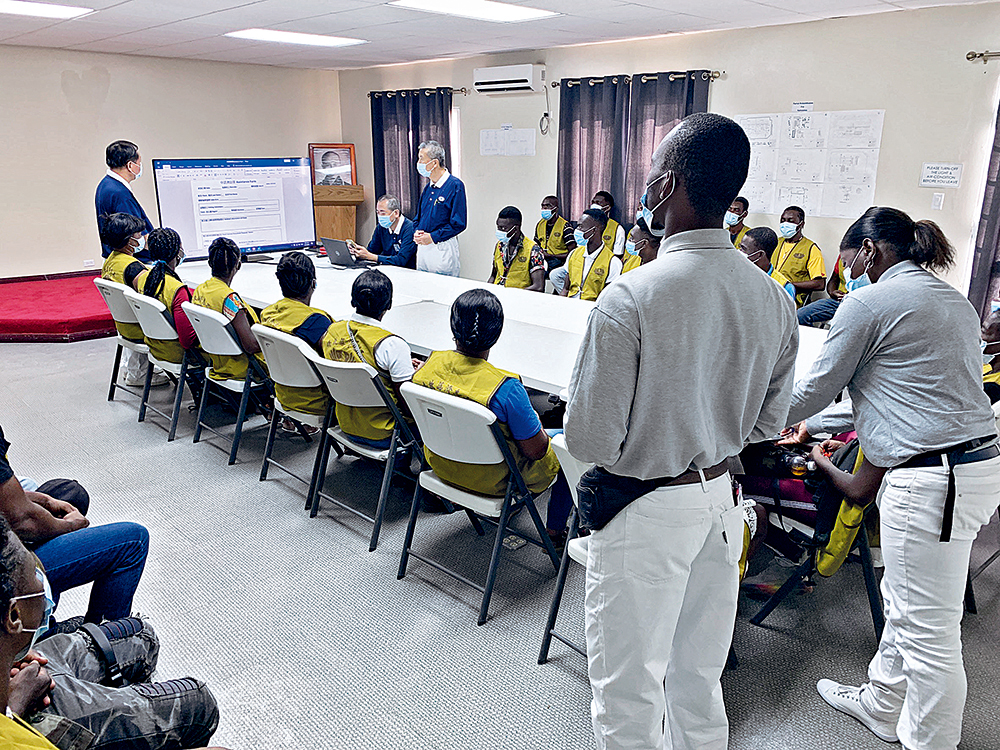
A Tzu Chi volunteer training class in session. The purpose of such classes is to inspire and help more people in Haiti to serve their own people. (Photo by Ting Fan)
Cutting It Close
In a warehouse that belonged to the supplier in Port-au-Prince, 5,000 sets of food aid that Tzu Chi was going to distribute to quake survivors were stacked in neat piles, ready for transportation to distribution venues. The bags of rice and assorted food items all had handles, which would make them easier for recipients to carry.
Dashka Bennett, vice president of the supplier, had worked for days with Tzu Chi volunteers to help them pull off the relief mission this time. She said to the volunteers, "You guys are all foreigners and you are doing so much for my country that has motivated me to do more for my country. I try to do what I can within my sector, but Tzu Chi really touched me. I mean if you guys can leave your homes, your country, and your jobs and come here to help, I should be able to do more also."
In addition to preparing for distributions, volunteers also conducted training classes for local native volunteers. They answered questions and listened to what the attendants of the classes had to say about volunteering with Tzu Chi in Haiti. At the same time, volunteer James Chen prepared several culinary volunteers for the hot meal distributions the foundation was planning to launch later by teaching them how to prepare Tzu Chi instant rice. Everything seemed to be going well, but challenges soon arose.
Because some roads were blocked by gangs, the goods provided by Tzu Chi could not be transported in time to the disaster areas for a September 8 distribution in Les Cayes. Volunteers contacted nuns of the Soeurs Salésiennes in the city with whom they were working to hold the distribution to talk about postponing the event, but the nuns had already sent out the claim checks for the distribution to one thousand participating families. The recipients were all looking forward to receiving the aid on the scheduled day.
Not wanting to disappoint so many families, the U.S. team asked Dashka Bennett if she could rustle up enough rice near Les Cayes to distribute to everyone on September 8. Bennett made call after call before finally finding suppliers that could provide 2,000 bags of rice, each weighing 12.5 kilograms, for the distribution.
It was September 6 when Bennett had completed the transactions—less than 48 hours from the scheduled time of the distribution. Would the 2,000 bags of rice arrive at the event venue in time? The jury was still out.
The Tzu Chi U.S. team in Port-au-Prince was on tenterhooks. And there were other events planned too, in addition to the September 8 event. Would the relief goods for those other distributions arrive in time from Port-au-Prince? James Chen said he was so worried he had difficulty falling asleep for several nights in a row.
To help Haiti recover from the massive quake, Taiwan's government, the Tzu Chi headquarters in Taiwan, and the Taiwan Red Cross had together provided 25 tons of goods to donate to people in Haiti. A donation ceremony was held on September 7 in Port-au-Prince. Tzu Chi volunteers, still on pins and needles, attended the event. Haiti's acting president, Ariel Henry, was also present, as well as Taiwan's ambassador to Haiti, Ku Wen-jiann (古文劍). That afternoon at four, the Tzu Chi U.S. team and volunteers in Port-au-Prince set off in two groups from the capital to Les Cayes, 150 kilometers (93 miles) away, to help with the distribution on September 8 and other distributions planned for the following days.
The groups made detours to avoid the road sections controlled by gangs. Though the strategy ensured their safety, it also prolonged the trips. It was almost midnight by the time the entire team arrived at Les Cayes. At six the next morning, trucks delivering the rice to be distributed that day arrived at the distribution venue. Even nuns who were getting on in years helped unload the rice. Parishioners enthusiastically helped out too.
James Chen breathed a sigh of relief when he saw the 2,000 bags of rice from different suppliers arrive safely. "I've taken part in countless distributions before," he said, "but this was the first time the goods to be given arrived on the very day of the distribution. This was practically a mission impossible."
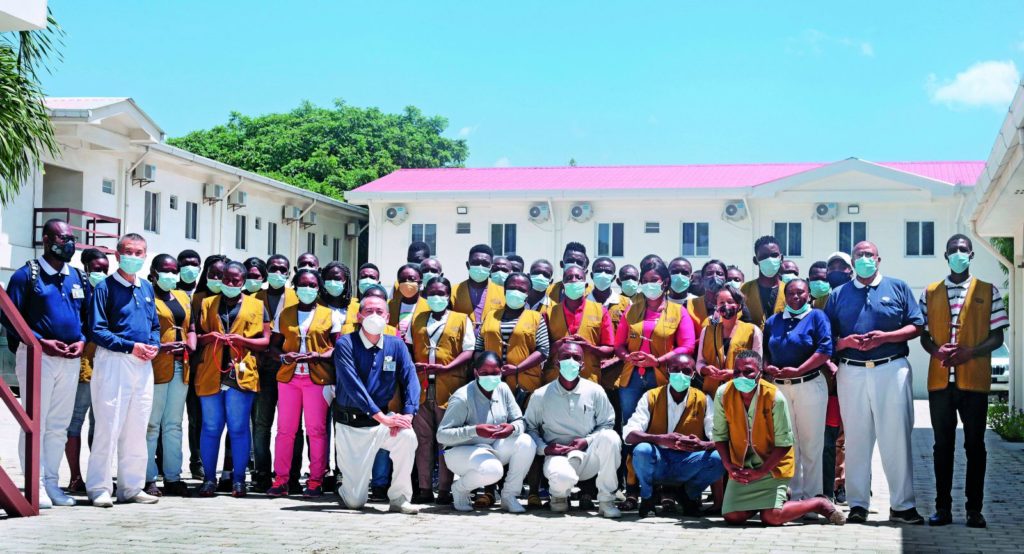
Members of a Tzu Chi team from the United States pose with volunteers in Haiti after a training course. James Chen (second from left), the leader of the Tzu Chi team, has visited Haiti 79 times for Tzu Chi work.
The Distributions
The scheduled distribution kicked off at ten that morning as planned. Quake survivors had started arriving early that morning and had been waiting outside the school that was serving as the event venue. With police on-site maintaining order, survivors entered the venue in an orderly fashion. Each participating family received two bags of rice, weighing a total of 25 kilograms (55 pounds). After receiving their rice, aid recipients left with smiles on their faces.
"My home was completely destroyed," said Rose Myrlie Jabrun, an aid recipient. "I got hit in the leg when the quake hit, and I've been sleeping in the street ever since. The price of food is very high now. Thank you for helping us." Alphonse Thermitus, another recipient, pointed out that there was a lot of hunger in the disaster areas and people were badly in need of food. "I hope God gives Tzu Chi volunteers more strength so they can come back and give us more help."
While quake victims received much needed food, volunteers gained joy from helping others. Jennyva Ocean, the daughter of volunteer James Ocean, said, "Before, when I wanted to participate [in Tzu Chi events], my father told me I was too young. Now that I'm 16, I asked to participate again. My father finally agreed. I'm very happy I can be here and contribute what I can."
After the distribution, the rice and other food items Tzu Chi had purchased in Port-au-Prince finally arrived in Les Cayes, in time for the other scheduled distributions. In cooperation with Caritas Haiti and the Salésiens de Don Bosco, Tzu Chi held two distributions on September 10 and 11 in the port city for more than 2,000 families.
At the distribution venues, people clutching claim checks waited peacefully to receive their supplies. Despite the long lines, they remained patient. After they had received their aid, most of them hurried back home by way of tap taps, colorfully painted buses that serve as shared taxis in Haiti. After all, it was extremely dangerous in a disaster area suffering from severe shortages of food to stroll through the streets carrying two big bags of food.
"I've never witnessed such a peaceful, orderly distribution in Haiti during which people showed such respect for each other," said Dashka Bennett after taking part in one of the distributions. "People were all smiles with the heavy bags of food they had received in hand." She added it was an honor to work with Tzu Chi and that taking part in the mission this time, bringing hope to families, had been a touching experience. "You can count on me to continue to serve the people in Haiti with you!"
About a month had passed since the earthquake by the time of these distributions, but many people in the disaster areas were still living in the streets. Food and medicine were still sorely lacking. James Chen really felt for the survivors. "The tent areas we've visited this time were a far cry from those we visited after the 2010 earthquake. Any place set up with tarpaulins is considered 'deluxe' this time. There was even a tent area consisting almost entirely of rickety structures shoddily built with palm fronds."
Tzu Chi volunteers will continue to work with local Catholic groups to deliver more aid to the needy. Besides providing food and other supplies, volunteers will also continue to offer training to local volunteers to help them serve their own people. They hope that with everyone working together, a synergistic effect can be created that can more quickly help quake survivors through the difficult time and get back on their feet.
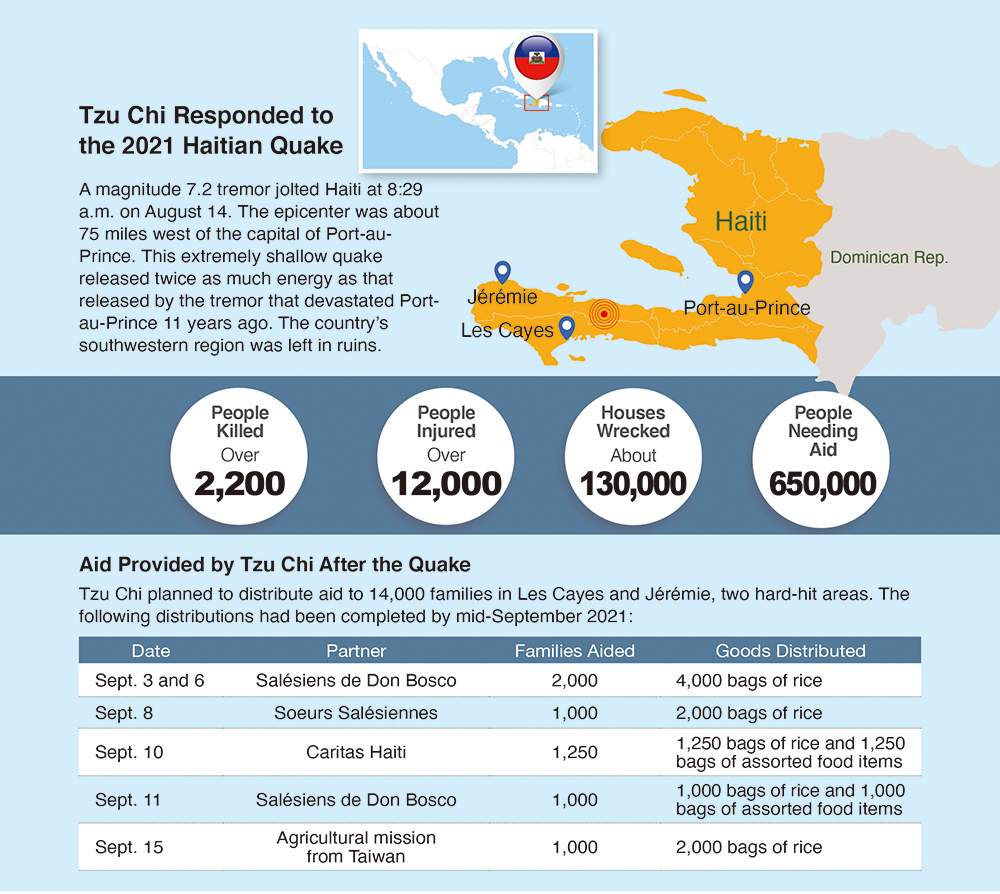
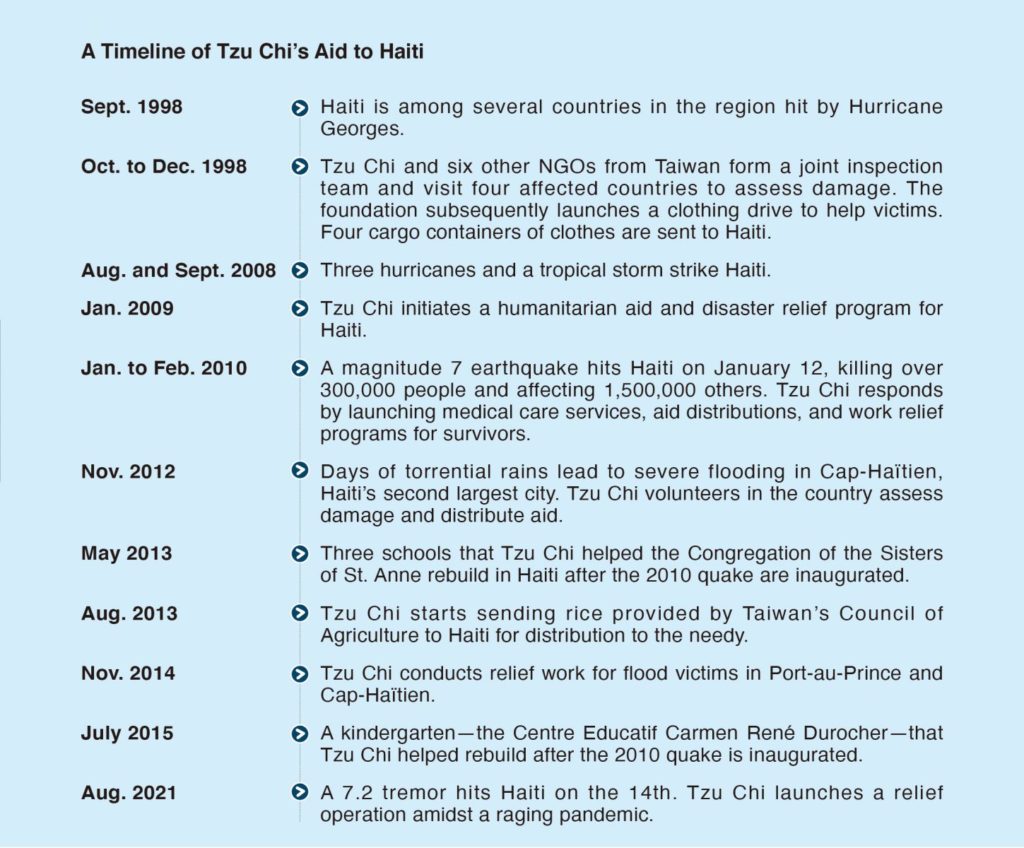
Contact Us | Plan a Visit | Donate
8 Lide Road, Beitou 11259, Taipei, Taiwan
886-2-2898-9999
005741@daaitv.com
©Tzu Chi Culture and Communication Foundation
All rights reserved.
